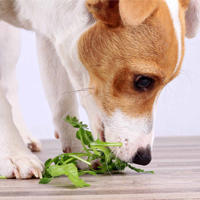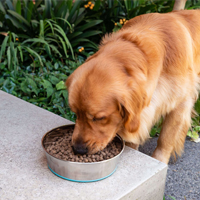
The Straight Goods on Common Dog Poisons
There’s a list of dog poisons that every dog owner should make themselves aware of and hopefully this article will help identify the most common ones.
The possibility of your dog ingesting something poisonous is higher than you may think. In fact, last year there were over 100,000 reported cases of pet poisoning in the United States alone. And those are reported cases. There may be no real way to know how many actual cases of poisoning there were and no real way to know how widespread these poisons really are.
Thank Goodness I Was Paying Attention!
Here’s an example of how quickly your dog can ingest something toxic. I stopped over a friends house with my dogs while on our morning walk. She wanted to show me something in her garage.
So the dogs walked around the garage as me and my friend talked, etc. I noticed my dog sniffing at something that looked like small pellets. I quickly realized that it was “rat poison” that my friend had put down because she was having an issue with mice.
I immediately got a hold of my dog and ran my fingers through her mouth to make sure there was nothing in there. Although she didn’t ingest any of the pellets, she very well could have if I wasn’t paying attention.
The good news is that a little awareness goes a long way. With that awareness, you can ensure that you avoid accidental poisoning of your dog. Keep these harmful elements out of the way of your dog to prevent accidental ingestion and, most importantly of all, educate yourself.
So what are some of the most common dog poisons?
Pet Poison Hotline
Medication for Humans
At the top of the list is medication for human beings. The scary thing is that it doesn’t take a lot of drugs to do a lot of damage and many dogs accidentally ingest things that are lying around where they shouldn’t be.
Drugs like ibuprofen can cause kidney failure and stomach ulcers in dogs, while anti-depressants can do serious damage as well.
Food for Humans
Along with medication for humans, food for humans is also often involved in cases of dog poisoning. Things like chocolate can be toxic for dogs, with methylxanthines leading to vomiting and even death in some cases. Alcohol can also cause problems, as can avocados. The sweetener xylitol, found in sugar-free gums and candies, has been proven to lead to liver failure in some dogs.
Flea and Tick Fighters
These products may initially seem beneficial for dogs in terms of fighting off fleas and ticks, but thousands of cases of dog poisoning are reported related to these products every year. Dogs can accidentally ingest flea and tick products, for instance, or dosage amounts can be improperly designated.
Household Plants
They may look nice around the house, but household plants are also responsible for a number of pet poisoning cases each year. Azaleas and rhododendrons flower beautifully, but they also carry toxins that create serious problems for canines. Tulip and daffodil bulbs also lead to trouble, causing things like stomach problems and even heart damage.
Household Chemicals
Unsurprisingly, household chemicals can also lead to significant problems when accidentally ingested. Chemicals in antifreeze (which dogs are often drawn to because of the sweet taste), paint thinner, pool-cleaning materials, and other household items have been directly linked to multiple health problems in dogs. Anything from chemical burns to depression has been linked to household chemicals.
These products are common and can be found in most households around the world, but they can be dangerous for dogs.
Now that you know what the most common dog poisons are, take extreme care by placing all chemicals out of reach and ensure that any other potentially harmful products are well out of your dog’s range.
Rat & Mice Poisons
Beware if you leave traps around the house or garage for rodents. Dog will DEFINITELY ingest those little pellets and and other rodent poisons. This happened to a friend whose dog had to have a blood transfusion. It’s a very nasty poisoning and dogs often have long term effects from it.
When dogs ingest bromethalin, itcauses a lot of neurological problems including seizures, tremors, back leg paralysis, lack of appetite and impairment. TAKE NOTE: many times symptoms won’t appear until 2 weeks later.










